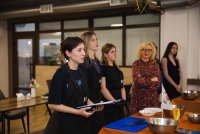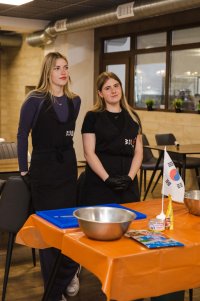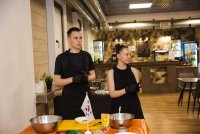The course ‘South Korea in the world of cultural diplomacy: history, language, traditions, cuisine’ has come to a successful end
 The educational and cultural course ‘South Korea in the World of Cultural Diplomacy: History, Language, Traditions, Cuisine,’ organised by the Department of International Relations and Diplomacy (coordinator — Olha Lebedovych, student majoring in International Relations) has recently come to an end. The course brought together over 40 participants from different parts of Ukraine who are interested in learning about Korean culture, language, and diplomatic practices.
The educational and cultural course ‘South Korea in the World of Cultural Diplomacy: History, Language, Traditions, Cuisine,’ organised by the Department of International Relations and Diplomacy (coordinator — Olha Lebedovych, student majoring in International Relations) has recently come to an end. The course brought together over 40 participants from different parts of Ukraine who are interested in learning about Korean culture, language, and diplomatic practices.
Five thematic events covering key aspects of South Korea's historical and cultural development were held as part of the course. In particular, at the event ‘History of Korea: From the 20th Century to the Present,’ participants learned about the peculiarities of the Japanese protectorate, independence movements, the course and consequences of the Korean War, as well as the political transformations that shaped modern South Korea.
Special attention was paid to the cultural dimension. The event ‘Culture and Traditions of South Korea’ introduced participants to the peculiarities of national holidays, traditional clothing, architectural heritage and symbolic cultural practices.
The grand finale was an event held in the training laboratory of the Department of International Tourism and Hotel Business at the B. Havrylyshyn Education and Research Institute of International Relations. It took the form of a master class entitled "Culinary Diplomacy: How Korean Cuisine is Conquering the World," during which participants, under the guidance of coordinator Olha Lebedovych, not only learned about the traditions of Korean gastronomy, but also had the opportunity to prepare kimbap themselves and taste other dishes such as kimchi and tteokbokki.
The course provided an excellent platform for intercultural dialogue and practical learning about cultural diplomacy tools, and deepened participants' knowledge of South Korea as an important player on the global cultural stage.



















